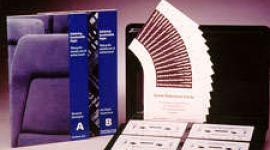Anxiety - Panic Attack Coping Tips
Here some helpful hints in dealing with the symptoms of anxiety/panic. Sometimes the simplest little diversions/gimmicks can help a great deal.
 Talk, Talk, Talk: a good deal of the time, anxiety is caused by unexpressed emotions of one sort or another. Expressing how you feel, especially to a "safe" person, is usually extremely helpful and therapeutic.
Talk, Talk, Talk: a good deal of the time, anxiety is caused by unexpressed emotions of one sort or another. Expressing how you feel, especially to a "safe" person, is usually extremely helpful and therapeutic.- Hit a pillow with a baseball bat! Physically releasing strong emotions in a safe way can also be a very helpful tool.
- Wear a rubber band: Snapping a thick rubber band on your wrist can be very distracting if you're feeling extremely anxious. Sometimes, just a change of focus can bring us back into "reality".
- Yell STOP!: Actually calling out the word STOP can alert you to end current negative thoughts, especially if you do it consistently whenever you catch yourself thinking negatively.
- Talk into a tape recorder: When you find yourself very anxious you can say everything you're thinking into a cassette recorder. Later, you can play it back and dispute everything you hear!
- Go slow and plan ahead: A lot of anxiety can be avoided before it gets to peak levels if you plan ahead for an occasion. Pace yourself and move slowly.
- Familiarize yourself: If you're going out to an event, it helps to "check the place out" before the actual day/time you have to go. By doing this, the physical place seems less like an "unknown" on the actual day and will often decrease anticipatory anxiety.
- Keep a Journal: Journal writing is a very effective tool for getting thoughts and feelings out on a regular basis. I've kept one for years and can see my progress regularly. I can also remind myself of tools I've used in the past to get through certain situations. It may be helpful to keep separate journals, i.e., an anger journal, a gratitude journal, etc. A gratitude journal is especially beneficial to keep on a daily basis. It reminds us of all the good things we have in our lives. :)
- Exercise: Exercise is a very good way of working off any kind of stress or anxiety.
- Proper Diet: Caffeine and sugar are known to add to anxiety symptoms. It's best to avoid them altogether or keep their intake to a minimum.
- Distraction: It's always helpful to distract yourself in anyway you can when anxiety is high. Often, I ask my friends (if someone is with me) to tell me a funny or even off-color joke or an outrageous story (even if it's made up!) just to try to get my mind focused on something else.
- Throw Eggs!: Throwing safe things, like eggs is often a good release for stress! If you're upset with a particular person, paint their picture on an egg. That's especially therapeutic! The eggs are biodegradable and can even fertilize your garden :)
- Meditate: Using a relaxation tape (especially a progressive one that instructs you to relax muscles in order) can be very useful in anxiety prevention. If you're going to a scheduled event, try doing a relaxation exercise an hour or more before the event. The more relaxed you start out, the more relaxed you're likely to be as the evening progresses.
- Listen to Music: Some people have trouble listening to relaxation tapes. Other methods of relaxation are also useful, such as: listening to soft music, taking a hot bubble bath, sitting in the warm sun, or just lighting some fragrant incense.
- Keep A Map Handy: If you're trying to practice driving skills, or just going out and have difficulty driving, it's helpful to carry a map. A map makes you feel less self-conscious in case you have to pull over to calm down. You can just look at it and not worry about what people think while you're sitting there. "What people think" is one of the root causes behind a lot of our anxieties.
- Use "ABCD" cards: A nifty little technique I learned in my travels through the wonderful world of counseling was to use "ABCD" cards. Basically "ABCD" cards are just index cards. You write out a particular scenario that's playing around in your head using the A-B-C-D method. It is just easier to write one thought on each index card and keep reviewing them. For each thought you :
A: define the "activating" anxiety-producing event.
B: describe your "belief" about it.
C: describe what you believe to be the "consequence" of it.
D: "dispute" it.
Here are a couple of examples of how this works. It may seem a bit tricky at first, but they DO help enormously in turning around negative thinking!
- (activating event)=At a bank teller's window I have to wait while she checks something.
- (belief)=I'm afraid I'll pass out or get so anxious I'll go crazy.
- (consequence of that belief)=They'll haul me away and lock me up (concern about what people think??).
- (dispute)=I won't faint or go crazy...there is no evidence that that has ever happened to me. Once I leave my anxiety will come down--it always does.
Here's another example:
- =Driving to an unfamiliar place.
- =I'll get lost and have a panic attack and I won't know anyone.
- =I'll be left to die. People won't help me because they'll think I'm going crazy.
- =I could panic, but even if I do it'll pass and I'll be able to drive home. One doesn't die or go crazy from anxiety.
-- or --
- =Going to the doctor for a checkup.
- =The doctor will find a lump in my breast or some other serious thing.
- =I could have cancer or have to have an operation and go through all that that entails, including the possibility of dying!
- =The last time I went to the doctor for a checkup, he didn't find anything bad so I shouldn't expect the worst!
Try them, they really work!
next: Systematic Desensitization for Treatment of Agoraphobia
~ all articles on living with agoraphobia
~ anxiety-panic library articles
~ all anxiety disorders articles
APA Reference
Staff, H.
(2007, February 20). Anxiety - Panic Attack Coping Tips, HealthyPlace. Retrieved
on 2026, March 3 from https://www.healthyplace.com/anxiety-panic/articles/anxiety-panic-attack-coping-tips

